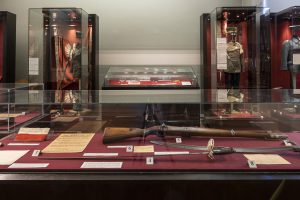Classes I-VIII, High Schools
Most topics designed for schools can be implemented in all age groups, the division into school classes is rather arbitrary. Based on their knowledge of the group, the teacher chooses a topic that is most closely related to the school program being implemented.
Themes of Museum Lessons:
Herb, Colors and National Anthem of Poland
Lessons dedicated to the circumstances of the creation of the anthem and the colors and elements of the coat of arms. During the classes, a flag, a banner, a banner and other signs are presented.
Stay a bachelor and a lady of the Order – of knights and soldiers.
A lesson combined with a staging of a medieval knighting ceremony and the reception of an order. At the museum exhibition, the functioning of these traditions in the Polish army will be presented.
In the days of knights and ladies
Classes conducted by a real knight, using reconstructions of objects from the era, answering questions such as: who were knights and what they did, what weapons and armour looked like, what life was like for a medieval lady. At the end an enactment of the knighting ceremony and appointment of a lady to the order is conducted.
Polish military symbols
The History of Polish Military Symbols, mainly banners and standards, based on objects found among the exhibits of the Museum.
The Polish Army’s Insignia and Uniforms 1918–2008
The story of the appearance of the Greater Poland Army and the reborn Polish Army of various types of services, Polish Armed Forces in the West, People’s Army of Poland, Armed Forces of the Third Polish Republic, to the Polish Military Contingent in Iraq, as presented on the museum exhibition.
Polish Navy
Remembrance of the History of the Polish Navy, its colors and weapons based on the displayed museum exhibits.
Seventeenth-century Polish Wars
The lesson is a supplement to History classes. Students have the opportunity to view elements of armament (armors, weapons, cavalry rows) used on battlefields in the 17th century.
Hell in the Trenches – World War I
The classes answer questions about the ways of fighting during the Great War – what kind of uniforms, equipment and weapons were used, what was successful in battle and what the soldiers of the fighting powers did to survive. The realities of this brutal but often overlooked conflict, which had a significant impact on the history of the world and Poland in the 20th century, will be brought closer with the help of photographs, exhibits and souvenirs.
The Greater Poland Uprising of 1918–1919
The lesson introduces students to the iconographic material, mementos, uniforms and weapons associated with the uprising.
Historical Panoramas
By viewing the largest preserved fragment of the Wojciech Kossak’s panorama Battle of the Pyramids, students become familiar with battle painting and Polish arms traditions.
The uhlans have arrived
In reference to the memorabilia presented at the exhibition related to the 15th Poznań Lancer Regiment, known as “Children of Poznań”, students will hear a story about service in Polish cavalry regiments and traditions continued in the contemporary Polish Army.
Old weapons – beautiful weapons
The classes present collections of the Museum. By exploring the permanent exhibition, students become acquainted with the history and traditions associated with the use of white weapons and various types of firearms. They look at objects, which not only had a utilitarian character, but also as works of art were a source of prestige and a desirable object for collectors.
Tickets
| lesson | 85 PLN |
| lesson + workshop | 100 PLN |
| guided tour | 120 PLN |
Practical information
Lessons will take place from Tuesday to Friday during the Museum’s opening hours for the public.
COSTS
+ Admission tickets: 1 PLN from students (children and youth aged 7-26), children under 7 get free tickets.
Two supervisors of the group get free entry, the next persons must buy a ticket (8 zł reduced, 12 zł normal).
RESERVATIONS
Reservations must be made at least one week in advance. The museum reserves the right to refuse reservations in case of lack of availability. Museum lessons reservations are accepted by phone from Monday to Friday between 8:00 am and 15:30 pm. +48 61 85 26 739





